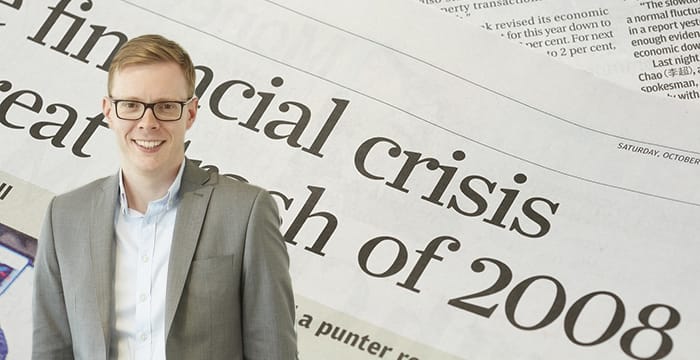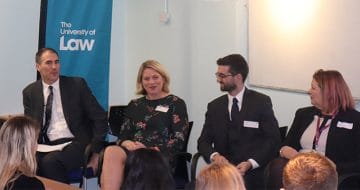ULaw campus dean, Matthew Tomlinson, reveals why Leeds is on the up-and-up ahead of tomorrow’s ‘Secrets to Success’ event in the northern city

When Matthew Tomlinson began his training contract at DLA Piper’s Manchester office in 2009, little did he anticipate the challenge waiting for him upon qualification. Reeling from the 2008 financial crisis that had caused the UK’s economy to slide, the northern legal market grappled with a decline in work. “It was drying up,” Tomlinson recalls.
As a result, trainees, like Tomlinson, looking to qualify into areas hardest hit such as corporate finance and real estate, faced a difficult choice — sit tight and wait for the economy to recover or move to areas of the law which were less affected.
Tomlinson points to a fellow trainee who at the time was so determined to remain in finance that he took up a paralegal role at Clifford Chance upon qualification. Although having to take a step back, the gamble paid off: he went onto an associate role in Allen & Overy’s Bangkok office before later joining Stephenson Harwood in Singapore.
Alternatively, trainees could change specialisms — a route Tomlinson opted for. “Where firms wanted to retain their trainees, they had to be creative in how to house them,” he explains. So, after finishing his training contract in 2011, Tomlinson moved into DLA Piper’s corporate restructuring and insolvency team that prospered during the economic downturn. As Tomlinson explains:
“The amount of calls on loans being made often meant borrowers couldn’t meet the contractual terms, so banks were taking back property and businesses were going into administration — meaning there was a plethora of legal work on offer.”
After leaving DLA Piper in 2013, Tomlinson completed a brief stint at Addleshaw Goddard before moving to Napthens, a Preston-headquartered private client practice that sought to build its commercial arm. Although smaller in comparison to his previous legal employers, the firm’s more relaxed internal structure afforded Tomlinson greater freedom and responsibility in handling his own cases.
Despite the opportunity for development that Napthens offered, Tomlinson ultimately grew weary with private practice. “I found transactional work very repetitive — there was not a lot of scope for creativity,” he says. Keen to seek out a more creative and interactive role, Tomlinson took up teaching. He began as a part-time guest lecturer in the evenings and weekends, before leaving practice altogether to teach full-time at The University of Law (ULaw). Nearly six years later, Tomlinson was recently appointed dean of ULaw’s campus in Leeds.
A decade on from economic turmoil, the northern legal market is going from strength-to-strength — and Leeds is leading the way. Home to the so-called ‘big six’ mid-market heavyweights — Addleshaw Goddard, DLA Piper, Eversheds Sutherland, Pinsent Masons, Squire Patton Boggs and Walker Morris — the city has also opened its doors to national firms such as Gateley, Freeths and Shoosmiths. Tomlinson attributes this influx of new firms to Leeds’ rapidly expanding labour market, increasing private sector investment, cultural rejuvenation and its commuter friendly transport connections.
But what does this sector boom mean for aspiring lawyers? Positioned as the country’s fastest growing legal hub ahead of London, Manchester and Birmingham, Leeds is an attractive contender for aspiring lawyers who are keen to avoid the high living costs associated with living in the capital. “The reality is now there are more graduate opportunities than there are graduates in Leeds,” Tomlinson says.
Although eager to tap into Leeds’ pool of graduates, firms remain wary of the challenges surrounding the retention of talent (the lure of London remains a problem), and are therefore keen for would-be solicitors to demonstrate an understanding of the city’s legal market.
With this in mind, when reading training contract applications, firms now have two key questions on their mind, the first being: ‘Why do you want to work in the north?’, followed by: ‘Why do you want to practise at this particular firm’s office in Leeds?’. Rather than offer a generic answer, take this opportunity to show detailed knowledge about the firm, why they’re different from their local competitors and how they can build their market share, Tomlinson advises. That said, avoid looking at firm’s offices in isolation — you need to understand their market position both in the UK and internationally, he adds.
Before coming to law, Tomlinson studied international business and French at Sheffield Hallam University, a “progressive sandwich course” that saw him spend two years abroad in Paris. Working in France’s real estate sector, Tomlinson gained exposure to commercial leases — sparking his interest in the law. It was this experience and Tomlinson’s multilingual talents — he speaks French, Spanish and German — that caught the attention of international firm DLA Piper.
Asked if he felt his non-law degree from a non-Russell Group university had made it more difficult to pursue a career in law, Tomlinson told us:
“DLA Piper, like a lot of firms at the time, were more holistic in their approach to graduate recruitment — they were looking at the skills of a potential trainee, over where they had studied. They wanted candidates that were very inquisitive as to what their clients needed and understood the business sector their firm operated in. Having come from a business background, I was a good fit.”
Matthew Tomlinson will be speaking alongside lawyers from Pinsent Masons, Walker Morris and Womble Bond Dickinson at tomorrow’s ‘Secrets to Success’ event, at The University of Law in Leeds. You can apply for one of the final few places to attend the event, which is free, now.


